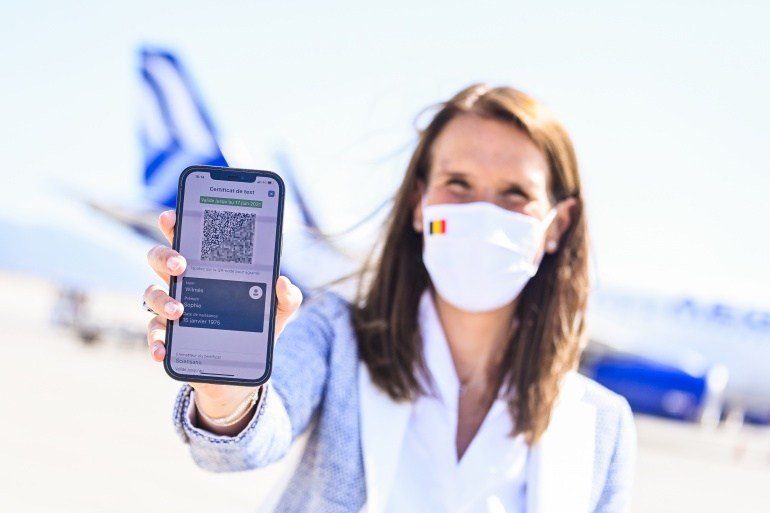While the Covid Safe Ticket that Belgium will soon start using is very similar to the EU Digital Covid Certificate that is already in use, there are some key differences between the two.
Both the Covid Safe Ticket, which will become available from 13 August, and the already existing EU Digital Covid Certificate have the same goal: proving that the holder has antibodies against the coronavirus.
This is possible for people two weeks after they are fully vaccinated, if they have a recent negative PCR test result, or if they recovered from a Covid-19 infection during the last six months.
However, there are some important differences between the two types of certificates.
The Covid Safe Ticket
The Covid Safe Ticket is only valid within Belgium, and is specifically intended to allow people to gain access to events without having to wear a face mask or keep a 1.5-metre social distance.
As decided by the Consultative Committee on Monday, organisers can require the Covid Safe Ticket for outdoor events with 1,500 or more attendees from 13 August.
From 1 September, indoor events will also be able to use the Covid Safe Ticket, but it is not yet clear if it will only apply to events with a minimum of 1,500 people, or if smaller venues will be able to use it as well.
Additionally, organisers are not obligated to work with the Covid Safe Ticket. If they do not want to ask attendees to use it, face masks and respecting the social distance remain compulsory.
Important: a negative test result is only valid for 48 hours, and only a PCR test is accepted. Rapid tests are not accepted as they are less sensitive.
Following the Consultative Committee, Prime Minister Alexander De Croo stressed that the Covid Safe Ticket is only meant for professionally organised events (like festivals or sporting events), not for private parties.
It cannot be used as an entry pass for shopping centres or residential care centres, bars, restaurants or other hospitality establishments, like France will be doing from August.
The EU Digital Covid Certificate
The European certificate was introduced at the beginning of July, and serves to facilitate travel within the European Union (including Iceland, Norway, Switzerland and Liechtenstein).
In contrast to the Covid Safe Ticket, the Digital Covid Certificate is valid in all EU member states.
To travel, a negative PCR test result cannot be more than 72 hours old. Some countries, however, also accept a negative antigen test or rapid test, which cannot be older than 48 hours. Self-tests are not accepted.
How does it work?
"From a technical point of view, the Covid Safe Ticket and the European Covid Certificate are really just the same," Barbara Van Den Haute of Digital Flanders, which is responsible for the digitalisation of public services, told VRT.
Both work with QR codes that automatically appear on your smartphone via the CovidSafeBE app.
"However, a negative PCR test result more than 48 hours old will give a red light when the QR code is scanned at the entrance of an event, while the same code will give a green light in the airport to travel," said Van Den Haute.
"At the moment, we are in the process of looking into how we can avoid tampering with those QR codes, as happened in the Netherlands," she said, adding that the solution will be ready by 13 August.
In practice, it concerns three different certificates: a vaccination certificate, a test certificate or a recovery certificate. Each one is a different QR code that is automatically added to the CoronaSafeBE app on your smartphone.
Additionally, those QR codes can also be requested from official government websites such as mijngezondheid.be and, for people living in Flanders, mijnburgerprofiel.be.
Requesting to have your certificate sent to you by post is possible as well by calling the helpdesk. Flemish residents should call 078 78 78 50, Walloons can call 071 31 34 93, and people living in the Brussels-Capital Region can 02 214 19 19. There will, however, be a waiting period between ordering and receiving the certificates.

